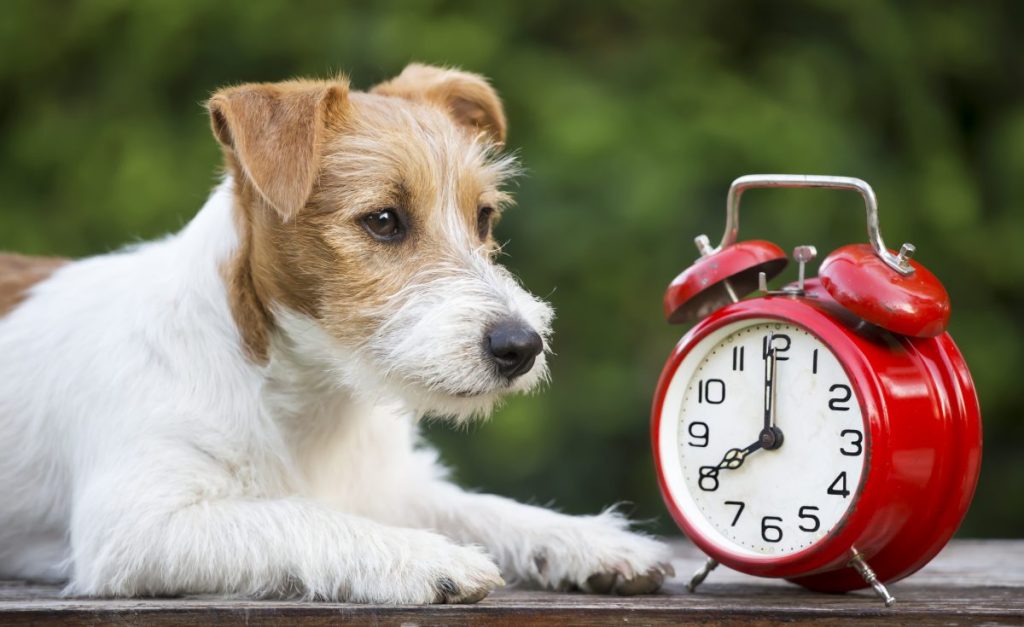Daylight Saving Time ends on Sunday, November 3, 2024, at 2:00 a.m. For humans, the extra hour is a great way to catch up on sleep. However, for dogs, the effects can be very different.
Animals don’t set their routines by the clock that we use as humans to keep on schedule. They have their own circadian rhythm — a biological clock that helps them know when to eat, sleep, go potty, and do everything else in their day.
So, when humans change the clock for the end of Daylight Saving Time, it can affect dogs more strongly. Here are a few ways your dog might struggle during this time and what you can do to help them adjust.
Potty time adjustments
Many dogs need to go outside for a potty break first thing in the morning.
When you sleep in for an extra hour, your pup might be confused. They may sit next to your bed waiting for you to put on your slippers and grab the leash. If you ignore their pleas, they might not be able to hold it in. An unfortunate rug may just become the spot where they choose to do their morning business.
Most pooches stick to regular potty times throughout the day, so it will take some time before they can adjust. Just be mindful you may need to adjust by an hour and modify your schedule by 15 to 30 minute intervals until you get into a new routine with your pup.
As you fall back, your dog’s feeding time may need to change
If your dog is used to eating at a certain time, they might be a bit upset when breakfast or dinner is coming an hour late.
Don’t be surprised if your pup sits by their empty bowl, looking up at you with their best “feed me” puppy dog eyes.
When food doesn’t come on time, your pup might act out by begging. What’s worse, they may even begin chewing things they shouldn’t chew or raiding the garbage cans. Literally, keep a lid on it and their behavior by modifying their feeding schedules if need be.
Plan for more meaningful together time with your dog, who is confused by the time change
When you go to work, your dog misses you. You’re their family — their pack. They’ll probably be happy to get an extra hour with you in the morning, but they expect you to come home when the sun is at a certain point in the sky.
When you return an hour later than normal, especially once the sun has already gone down, they can suffer added anxiety.
This stress can lead to all sorts of unwanted behavior, including having accidents or destroying your belongings. Be gentle and kind while they adjust to the time change.
How you can prepare your dog for the end of Daylight Saving Time
You can help your dog prepare for the end of Daylight Saving Time in a way that will reduce stress or unwanted behavior.
In the weeks leading up to the end of Daylight Saving Time, adjust your schedule by a few minutes at a time. Hold off on morning walks for a couple minutes. Don’t force your pup to hold it for long — just enough to get used to the new time.
Feed your dog meals a bit later in weeks leading up to the time change so they can acclimate gradually. Run a short, few-minutes errand or two before you get home from work so your pup can adjust to you arriving when the sun is down.
If the time change has already happened, don’t fear. You can also start making scheduling changes in small increments of time. If you work from home, you’ll be able to make this adjustment easier for your pup. Otherwise, you may be able to start your day earlier and clock-out earlier if you have the luxury of a flexible working environment.
Regardless of your situation, pay extra attention to your dog’s needs during this transition. It is important to offer them extra comfort if they show signs of stress or act out.
As Daylight Saving Time ends, make sure you ease the effects of your new schedule on your dog. Enjoy the extra hour of sleep, but take steps to reduce your pup’s anxiety. This way you can make the Daylight Saving Time switch a positive experience, rather than a stressful one.










